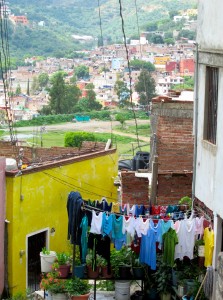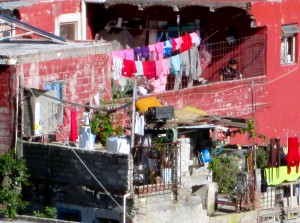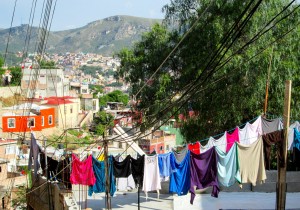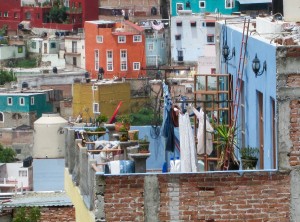One of the first Spanish words I learned when I settled in to Guanajuato, Mexico, for the summer was lavanderia. It’s since become a favorite word and a special weekly destination. On Thursday mornings I pack a week’s worth of dirty laundry into a big, green, carry-bag (una bolsa verde), and trudge down the steep alleyway (callejon) looking like Santa with his sack, to the hole-in-the-wall lavanderia near the university in el centro.
There, the pleasant matron takes la bolsa verde from me, weighs its contents, takes my name (I say “Bonita” because she can’t seem to get “Bonnie”; she looks at me quizzically and smiles; I smile and shrug my shoulders as if to say, “Well, my mother thought so”), I pay for their services – usually 50 pesos, or about $3 US dollars – learn when I can pick it up that afternoon, then go on my merry way.
Like magic, at 3 or 4 pm when I return, I’m given clean, dry, fluffy, nicely folded, sweet-smelling laundry wrapped neatly in a large, clear, plastic bag. And I think: I could get used to this. The matron greets me warmly and smiles at me, knowingly. Of course. By now she knows me; my laundry has told her everything: I’m single; I don’t own sexy lingerie; I like jeans; I live in cotton T-shirts and tank tops, most of which are turquoise; I wear gray flannel pajamas to bed; I own one bath towel, which is getting mighty frayed. This old “Bonita” is no fashionista, to be sure.
In my travels a pie (on foot) here – which are considerable (all of my clothes, such as they are, are getting way too big for me from all this walking) – I’ve taken to taking photos of laundry hanging outdoors. Others — known as tourists — take photos of monuments, architecture, plazas, people, churches, and balloon-sellers, all of which there are in abundance to be photographed here. Me? I don’t consider myself a tourist. I’m a born ex-pat. I’m an anthropologist-archaeologist wannabe. But instead of sifting through ancient people’s garbage to learn about their ways of life, I take pictures of living people’s laundry.
Laundry, I think, tells stories: The size of the family, the number of children and their approximate ages, the dad’s employment. A new baby’s onesies? An abuela’s (grandma’s) apron? Without meeting the families or entering their homes, I feel as if I could write about them and their lives.
For one thing, I would know that they probably can’t afford to take their laundry to a lavanderia. It’s likely that the resident abuela washes the family’s clothes by hand (just as I learned to do in Africa in the Peace Corps, which was an excellent exercise in empathy with the majority of women in this world), then hangs them out early in the day on the terrace in the sun, hoping they will dry before the rain clouds blow in, in this rainy season.
I’m stopped in my tracks on my walks. The colors of the clothes on the lines, mingled with the colors of the houses climbing up the sides of this fascinating, bowl-like city, form a kind of patchwork quilt for me of vibrant, colorful humanity. To me, this is bonita (beautiful). So I must take pictures and make up stories in my mind.




